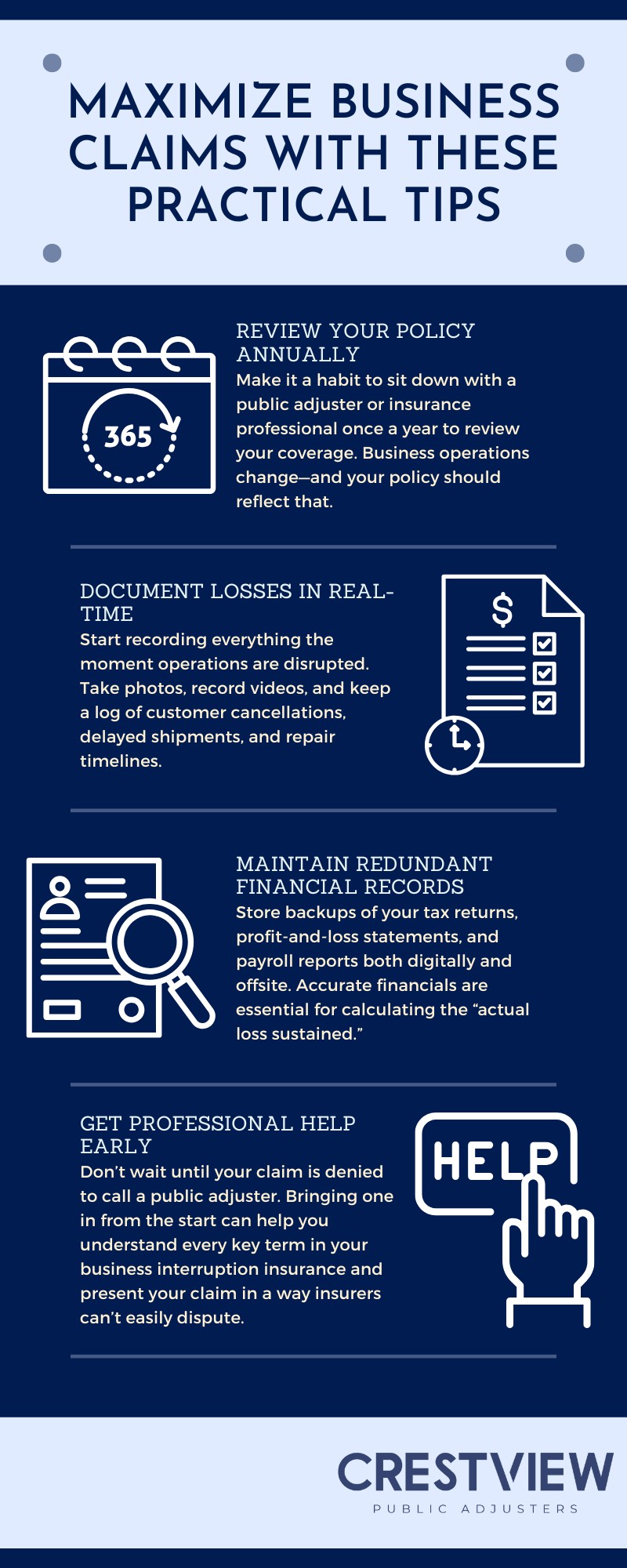Key Points:
- Business interruption insurance covers income loss and operational expenses during a covered disruption, but policies vary significantly in scope and definitions.
- Understanding critical terms like “period of restoration,” “extra expense,” and “contingent business interruption” is essential for accurate claims.
- Public adjusters help policyholders navigate complex language and negotiate fair compensation from insurers.
Key terms in business interruption insurance are the specific definitions and clauses that determine how, when, and what your insurance will pay if your operations are disrupted. These terms dictate coverage, limitations, and timelines—which is why understanding them can directly impact how much compensation you receive and whether your claim gets denied.
Why Is Business Interruption Coverage So Important?
According to FEMA, 25% of businesses don’t reopen after a major disaster. The financial fallout from even a temporary shutdown can cripple operations. Business interruption (BI) insurance is designed to replace lost income and cover ongoing expenses when you’re forced to close due to a covered peril, like a fire or storm. But the fine print matters more than most realize. Coverage isn’t one-size-fits-all, and a misunderstanding of your policy’s wording could leave you uncovered when you need help the most.
This is where knowing the key terms in business interruption insurance becomes a powerful advantage. It can mean the difference between a full payout and a frustrating denial.
What Is Typically Covered by Business Interruption Insurance?
Business interruption insurance doesn’t just cover lost revenue—it goes deeper than that. The scope of coverage generally includes:
- Net income the business would have earned during the closure.
- Fixed operating expenses like rent, payroll, and utilities.
- Temporary relocation costs.
- Costs to continue operations at another location (within limits).
- Additional expenses incurred to minimize the loss.
However, coverage depends heavily on specific policy language. Below, we dive into the most critical terms every policyholder should understand.
Most Important Key Terms in Business Interruption Insurance
Navigating business interruption insurance without knowing the key definitions is like signing a contract in another language. Here are some of the most essential terms explained in clear, actionable language:
Period of Restoration
This is the timeframe during which your business can claim lost income.
The “period of restoration” starts after a waiting period—often 72 hours—and ends when the property is repaired or should reasonably have been repaired. Insurers often interpret this narrowly, so it’s crucial to understand:
- It does not cover delays caused by permit issues or contractor shortages.
- It may end before your actual reopening date if the insurer deems repairs could’ve been completed sooner.
- You typically can’t extend this period unless explicitly stated in the policy.
Actual Loss Sustained
The actual loss sustained refers to the amount of income the business actually lost due to the covered event. It’s not a flat rate payout; it’s calculated using:
- Historical financial records.
- Sales projections.
- Market conditions.
Policies may set limits or caps, so even if your calculated loss is significant, you’ll only receive compensation up to the policy limit.
Extra Expense
This term refers to the necessary and reasonable expenses you incur to keep your business running during the restoration period—beyond normal operating costs.
Examples include:
- Renting temporary office space.
- Leasing new equipment.
- Paying for expedited shipping to meet customer deadlines.
The key is documentation. You must prove that the extra expenses were essential and reduced your overall loss.
Contingent Business Interruption (CBI)
CBI coverage extends your policy to include losses stemming from issues affecting third-party businesses you depend on. For example:
- A key supplier experiences a fire and can’t deliver inventory.
- A major client is forced to shut down and halts orders.
However, CBI only applies if the disruption is caused by a covered peril listed in your policy—and if the third-party business meets specific criteria. CBI claims are more complex and often denied without solid documentation.
Civil Authority Clause
If the government mandates a shutdown, this clause may cover income loss during the ordered closure. Civil authority coverage typically:
- Applies only when physical damage near your business prevents access.
- Has a short coverage window (often 2–4 weeks).
- Requires physical damage to be caused by a covered peril.
If you’re denied under this clause, it’s often due to disputes over proximity, damage verification, or whether the shutdown was preventative rather than reactive.
Ingress/Egress Clause
If access to your property is physically blocked (even if your business isn’t damaged), this clause might cover losses due to restricted entry or exit. Think:
- Road closures from a nearby fire.
- Police barricades during investigations.
Again, a covered peril must trigger the blockage for this to apply, and timing is everything. Waiting too long to notify the insurer can undermine your claim.

What Triggers a Business Interruption Claim?
Understanding what actually activates your business interruption coverage is critical. It’s not just about losing income—it’s about whether the cause of that loss is covered under your policy. Common triggers include physical damage to the property, such as from fire, storms, or vandalism; equipment breakdown, if that coverage is included in your policy; supplier disruption, provided you have contingent business interruption coverage; and civil orders that restrict access to your premises. However, for a claim to be valid, the loss must result from a peril specifically listed in your policy. For example, most basic policies exclude events like floods or cyberattacks unless you’ve purchased additional coverage for those risks.
What Are Common Exclusions in Business Interruption Insurance?
Business interruption policies often contain exclusions that catch policyholders off guard, limiting or denying payouts under specific circumstances. Common exclusions include damage from floods or earthquakes, which typically require separate coverage, as well as losses stemming from pandemics or virus-related shutdowns. Policies may also exclude claims related to wear and tear or gradual deterioration, along with utility service interruptions unless specifically added through an endorsement. It’s crucial to review these exclusions in detail and consult a public adjuster if anything is unclear.
How Is Business Interruption Loss Calculated?
This is where it gets technical, and mistakes can cost you.
Losses are calculated by assessing:
- Gross earnings before the disruption.
- Trend data or forecasted sales.
- Operating expenses that continue (or increase) during the interruption.
- Extra expenses you incur.
Insurers will scrutinize tax returns, profit-and-loss statements, and bank records. If your documentation is incomplete or inconsistent, the insurer may reduce your payout. A public adjuster can help you gather, present, and argue for the full value of your claim.
How Can a Public Adjuster Help with Business Interruption Claims?
Public adjusters represent you, not the insurance company. Their job is to interpret complex policy language in your favor, identify every applicable coverage and endorsement, prepare detailed loss documentation, and negotiate with the insurer to maximize your claim. Most importantly, they ensure you understand every key term in your business interruption insurance and help you avoid common pitfalls that could weaken your claim.
Practical Tips to Strengthen Your Business Interruption Insurance Claim
Filing a claim doesn’t need to feel like a battle. Following best practices from the start can help you avoid delays and get closer to a fair settlement. Here’s how to stay ahead of the curve:

Get the Support You Deserve from a Trusted Public Adjuster
If you’re struggling with a delayed or denied business interruption or cyber insurance claim, Crestview Public Adjusters can help you make sense of your policy. We specialize in supporting policyholders throughout Florida, New Jersey, and New York, with expert help in complex insurance language, accurate damage assessments, and strong negotiations.
We don’t work for the insurance company—we work for you. Contact Crestview Public Adjusters now to secure the claim settlement you’re entitled to.

